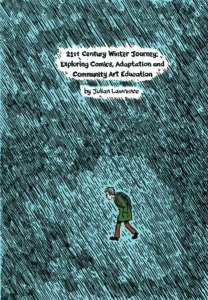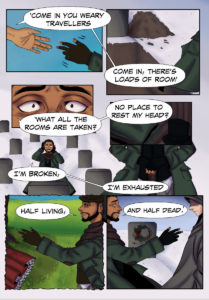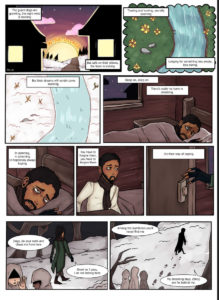We’re often told that research informs teaching, but what does that really mean? Here’s a great example of how the research undertaken by academic staff supports innovative teaching methods and informs teaching.
Senior Lecturer in Comics and Graphic Novels , Julian Lawrence is an award-winning cartoonist and educator specialising in comic books. Julian’s work concentrates on the undercurrents of communication through gesture in the medium of comics.
In June 2021 Julian presented his conference paper, 21st Century Winter Journey, at the Media Communication and Cultural Studies Association Conference (MeCSSA). The paper introduces his visual essay book chapter describing a collaborative comics-based research (CBR) project between a homeless charity and a cohort of 2nd-year university students. The 21st Century Winter Journey project explores the status of community art education (CAE) in Middlesbrough UK, and the ways learning and making comics impacts communities locally and internationally.

The project challenged Year Two students in Comics & Graphic Novels at Teesside University to make comics, do research beyond the classroom boundaries, and explore the surrounding local community. Academics and students partnered with staff and homeless members of Streetwise Opera (SWO) who were staging a performance of Schubert’s opera Winterreise. SWO provides resources and community support to people affected by homelessness across the UK. The task as a class was to collaboratively develop the opera into a narrative with SWO and adapt the libretto into a graphic novel.
Traditional comics-making methods informed the foundation of the project’s artistic practice:
• Rough sketches and thumbnails based on research
• Cleaner pencil drawings and lettering
• Rendering inks and colours
• Final, camera-ready artwork.
Following each iteration, SWO and Julian (as tutor) gave students feedback and revisions.

Julian suggests that analysis of the project widens conversations in CAE through Research Informed Teaching (RIT), Just-In-Time Teaching (JITT) and Paolo Freire’s “conscientizaçāo” (awareness). RITT, JITT, and awareness triangulate and locate learning in a community’s relational and public spaces. In applying these theories with cartooning practices, a powerful pedagogical tool emerges. When students become researchers and make comics they negotiate their understandings of community, their identities, and their futures. These observations are evidenced in the reflections students wrote as well as in the finished comics they submitted at the conclusion of the project. RIT, JITT, awareness, and cartooning guide the flow of artistic practice through shared group experiences within community spaces.

Forms of comics such as comic strips, comic books, and graphic novels are recognized internationally. Creative practices of making comics and cartooning are transferrable to schools, community centres, universities, and care homes everywhere. As such, the medium of comics functions as a transversal language and participatory culture that links people and communities together.
Tragically, the global pandemic hit as students were developing the comic, and all teaching migrated online. Despite increased pressure to self-isolate, socially distance, and learn online the 64-page graphic novel was successfully completed and deliverd as Christmas presents in December 2020. Julian continues to use live briefs to encourage research and create meaningful and community-based learning in and outside of the classroom for students.
The School of Arts & Creative Industries offers both a BA Comics & Graphic Novels and an MA Comics & Graphic Novels

